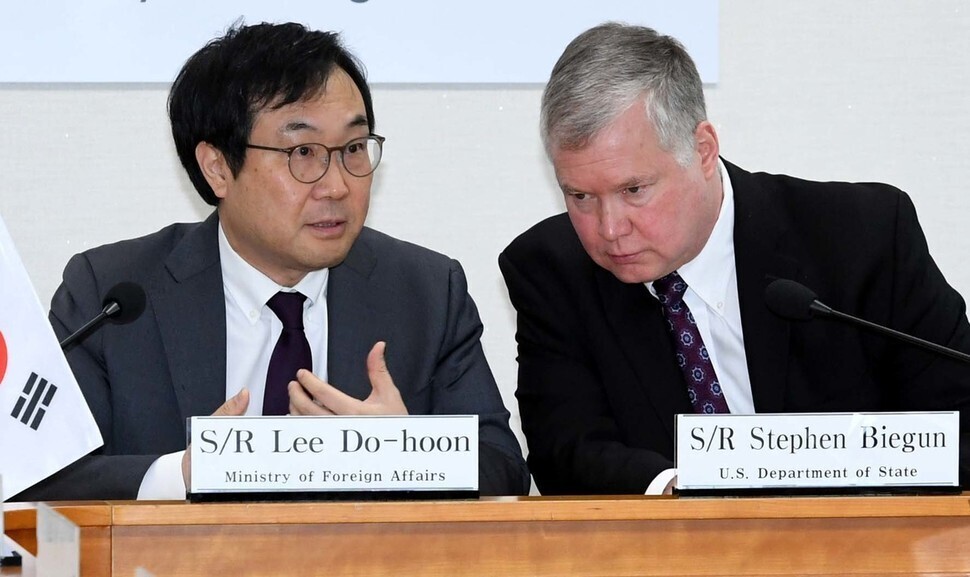hankyoreh
Links to other country sites 다른 나라 사이트 링크
[Editorial] The S. Korea-US working group needs a major overhaul

Lee In-young, the nominee to serve as the new unification minister, commented on July 6 about the controversy surrounding the South Korea-US working group, stressing the need to “distinguish the things we can achieve through the working group from the things we can decide on and do on our own.”
Lee also emphasized the need for “creative solutions,” noting that “North Korea sanctions are not an end in themselves.” The working group has increasingly come under fire, with critics claiming it has devolved into a way for Washington to use sanctions against North Korea to thwart progress in inter-Korean relations. Hopefully, Lee and the other members of the new foreign affairs and national security team will submit the group to a review and full-scale reforms.
Two months after the inter-Korean summit in Pyongyang in September 2018, South Korea and the US set up a working group to coordinate on matters such as denuclearization and inter-Korean cooperation efforts. Time and again, however, projects agreed upon by South and North Korea have been frustrated due to a failure to win US “approval.” Individuals with abundant experience in foreign affairs and national security policy have been among the most vocal in raising issues.
Former Presidential Chief of Staff Lim Jong-seok, who played a pivotal role in a past inter-Korean summit, was quoted in an interview in the summer issue of the “Changbi Quarterly” as saying that the only way the Ministry of Unification can play its part as the Cabinet agency in charge of inter-Korean cooperation would be for it to pull out of the working group, which he said has frequently been excessive in its interpretations of UN Security Council sanctions resolutions.
Lawmakers affiliated with the Democratic Party -- including Park Kwang-on, Kim Du-kwan, and Hong Ihk-pyo -- have joined former Unification Ministers Jeong Se-hyun and Lee Jong-seok in criticizing the working group for “shackling” inter-Korean relations. Civic groups have even been comparing the working group to a “new Governor-General of Korea” -- a reference to the Japanese colonial administrator in the first half of the 20th century>.
The attitude from the Ministry of Foreign Affairs has been comparatively passive. On July 2, Minister of Foreign Affairs Kang Kyung-wha said that discussions are under way toward improving the working group system, explaining that “these issues have been shared with the US, and there have been discussions on how to allay concerns by improving the way in which things are run.”
North Korea has taken aim at the working group, insisting that inter-Korean cooperation is being hampered by the Moon Jae-in administration’s “subservient” policies vis-à-vis the US. Some observers have assailed the raising of issues with the working group as effectively echoing the North Korean position. But North Korea’s public comments should not be used as a yardstick for decisions about South Korea’s policy. This matter needs to be addressed from a position of ownership of the Korean Peninsula’s destiny and bold diplomatic efforts to break through the current freeze in inter-Korean relations and resolve the North Korean nuclear issue.
US Deputy Secretary of State and Special Representative for North Korea Stephen Biegun arrived in South Korea on July 7. The South Korean government needs to clearly communicate the problems with the working group to him and hold proactive discussions on ways in which the system can be reworked. If the working group cannot be dismantled, then at the very least its framework needs to be revised to grant South Korea broad autonomy.
Please direct comments or questions to [english@hani.co.kr]

Editorial・opinion
![[Column] How opposing war became a far-right policy [Column] How opposing war became a far-right policy](https://flexible.img.hani.co.kr/flexible/normal/500/300/imgdb/original/2024/0702/5017199091002075.jpg) [Column] How opposing war became a far-right policy
[Column] How opposing war became a far-right policy![[Editorial] Korea needs to adjust diplomatic course in preparation for a Trump comeback [Editorial] Korea needs to adjust diplomatic course in preparation for a Trump comeback](https://flexible.img.hani.co.kr/flexible/normal/500/300/imgdb/original/2024/0702/9717199086060096.jpg) [Editorial] Korea needs to adjust diplomatic course in preparation for a Trump comeback
[Editorial] Korea needs to adjust diplomatic course in preparation for a Trump comeback- [Editorial] Silence won’t save Yoon
- [Column] The miscalculations that started the Korean War mustn’t be repeated
- [Correspondent’s column] China-Europe relations tested once more by EV war
- [Correspondent’s column] Who really created the new ‘axis of evil’?
- [Editorial] Exploiting foreign domestic workers won’t solve Korea’s birth rate problem
- [Column] Kim and Putin’s new world order
- [Editorial] Workplace hazards can be prevented — why weren’t they this time?
- [Editorial] Seoul failed to use diplomacy with Moscow — now it’s resorting to threats
Most viewed articles
- 110 days of torture: Korean mental patient’s restraints only removed after death
- 2Nine dead in Seoul after car plows into pedestrians
- 3Japan is building a military meant for more than self-defense — and has the US to thank for it
- 4[Column] How opposing war became a far-right policy
- 5[Editorial] Silence won’t save Yoon
- 6[Editorial] Korea needs to adjust diplomatic course in preparation for a Trump comeback
- 7Yoon’s prosecutors are throwing everything at the president’s opponents to see what’ll stick
- 8Samsung Electronics workers to go on first strike in company’s 55-year history
- 9Korea to create dedicated population strategy ministry to combat low birth rate, aging society
- 10[Column] The miscalculations that started the Korean War mustn’t be repeated